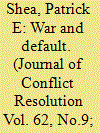| Srl | Item |
| 1 |
ID:
192390


|
|
|
|
|
| Summary/Abstract |
We study the changing landscape of credit market guarantees by examining the risk-pricing of the Chinese state-owned enterprise (SOE) bonds, which have experienced rising defaults across provinces from a zero record. Using primary market bond issuance data, we identify a province premium that captures the perceived local government support for local SOEs. We find that on average the perceived local government support is on the decline, while the subnational debt market has become more segmented since 2018. This evidence is found to be closely related to the divergence in local government’s fiscal space and the occurrence of SOE default incidents in the area, highlighting the adverse linkage between public debt and corporate financing costs.
|
|
|
|
|
|
|
|
|
|
|
|
|
|
|
|
| 2 |
ID:
171882


|
|
|
|
|
| Summary/Abstract |
his paper uses Renrendai data to study the relationship between monetary policy and the default behavior of borrowers, and analyzes the transmission channels. The research shows that tight monetary policy will lead to a significant increase in a borrower’s probability to default, and this effect will continue for several months. There may be two transmission channels: (i) monetary policy changes a debtor’s liquidity through credit and balance sheet channels, which directly affects their current repayment behavior; and (ii) monetary policy may affect a borrower’s investment, production and protability, thus changing their long-term solvency. The paper also nds that the repayment behavior of productive borrowers is more susceptible to monetary policy than consumptive borrowers, and that the default behavior of borrowers in coastal provinces is more susceptible to monetary policy than of borrowers in inland provinces. These ndings provide new evidence for understanding how monetary policy affects individual behavior and its transmission mechanisms.
|
|
|
|
|
|
|
|
|
|
|
|
|
|
|
|
| 3 |
ID:
189695


|
|
|
|
|
| Summary/Abstract |
Following the 2008 global financial crisis, years of low interest rates provided a rare opportunity for many developing nations to borrow in international markets—whether issuing bonds in their own currencies, securing loans from private-sector banks and commodity traders, or borrowing from China, which emerged as a dominant official creditor. Developing countries’ overall external debt rose to a record level during this period. As central banks raise interest rates sharply to counter a global rise in inflation, many of these countries are at risk of default. The mix of public and private creditors and the opacity of many loan terms make it difficult to coordinate restructuring. The key factor may be domestic politics.
|
|
|
|
|
|
|
|
|
|
|
|
|
|
|
|
| 4 |
ID:
161602


|
|
|
|
|
| Summary/Abstract |
Sovereign borrowing is often used to cover the costs of war. This borrowing, coupled with war’s economic disruptions, strains states’ ability to honor debt promises. Contrary to conventional expectations, however, we find that default is not common after wars. To explain the relationship between war and sovereign default, this article lays out a selection effect argument: war participants are unlikely to default in the first place, while states likely to default are unable to acquire the financing necessary to fight a war. In sum, states that lack the financial means to adequately borrow avoid paths to war. After offering some examples of the selection mechanism at work, we present evidence that states unlikely to default will avoid entering the war sample. Our findings have implications for the inferences researchers make about war finance and war onset.
|
|
|
|
|
|
|
|
|
|
|
|
|
|
|
|